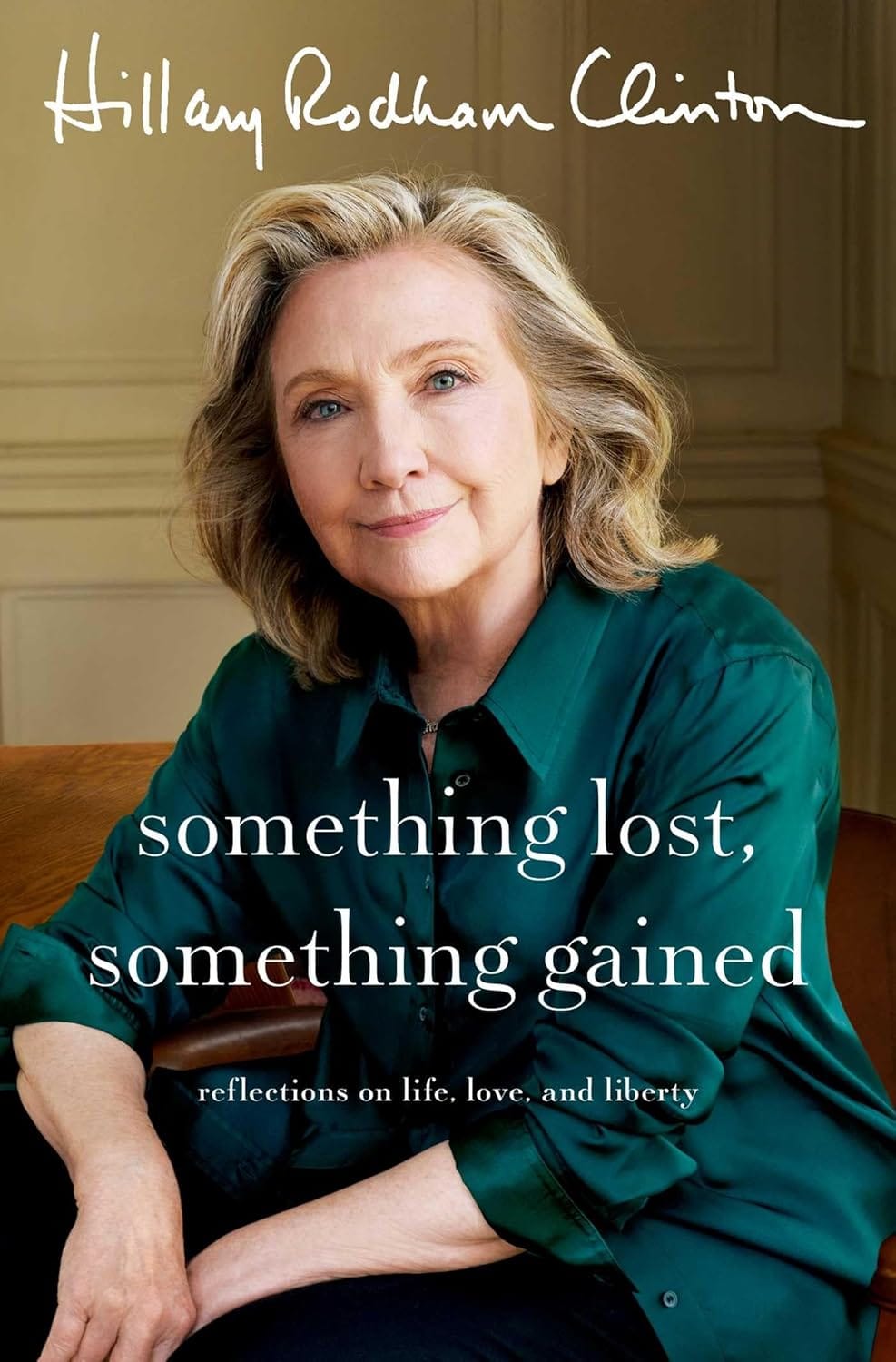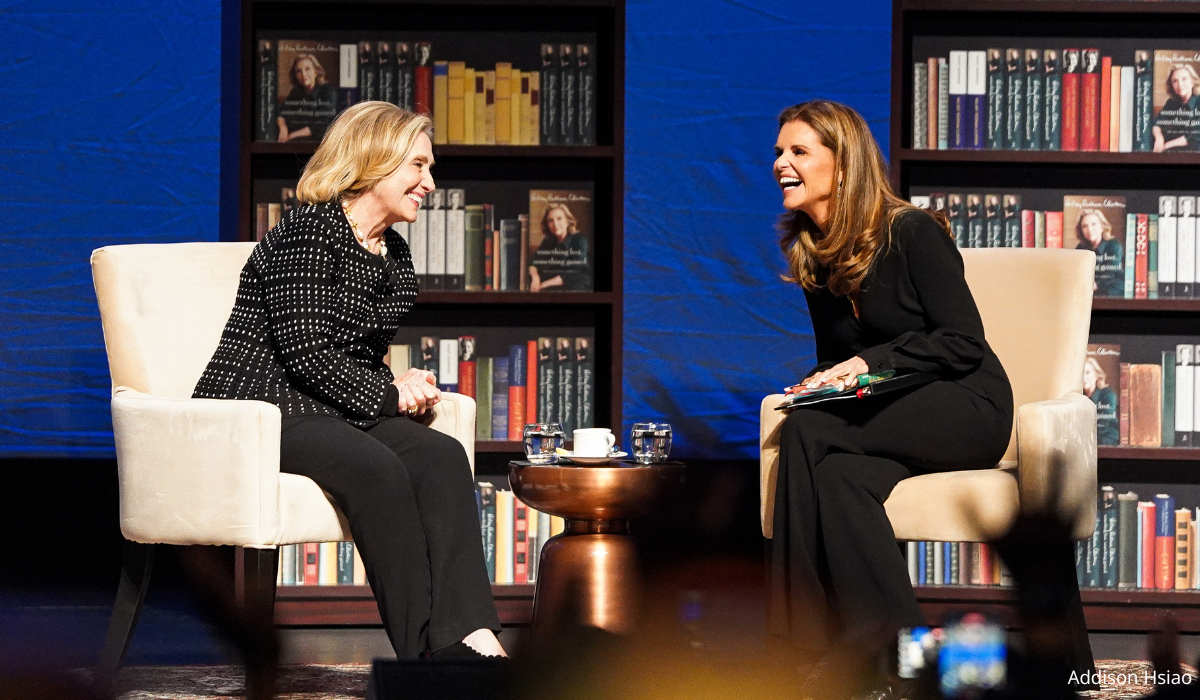Maria Talks to Hillary Clinton About, Well, Everything
In February 2024, Hillary Rodham Clinton sat in the audience at the Grammy’s, listening in awe as Joni Mitchell performed her hit song, “Both Sides Now.” Like the song does for so many of us, it prompted Clinton to think about her life. What had she lost? What had she gained? How had she dealt with the setbacks and disappointments in her life, and also the successes?
“When I first heard that song I was in my 20s and back then, I'd never really been in love and the idea of getting old seemed really, really, really far in the distance,” Clinton told Maria. “The title of my new book, Something Lost, Something Gained, comes from that great Joni Mitchell song. The book was a real opportunity to take a look at my life.”
So, what did Hillary learn when she looked back on her remarkable life? And what can the rest of us learn from her? Maria sat down with Clinton to talk about it all—politics, marriage, friendship, aging, letting go of dreams that were unfulfilled, and moving forward with grace, grit and purpose.
A CONVERSATION WITH HILLARY RODHAM CLINTON
I watched the speech you gave at the convention and was so inspired. You talked about the other women whose shoulders we all stand on. I wept. It broke my heart, really. And I know you said it was a hard speech to write and a hard one to give. Why?
Well, remember, I'd been asked to speak at the convention, first when Joe Biden was still running. That was a whole different assignment. And then after the president withdrew, the Vice President asked me to speak, and I wanted to do several things.
I wanted to really validate her and endorse her. I wanted to serve as a bridge from not just my race, but from what has been happening over the last four years in the Biden administration to the Harris nomination. And I felt like I was in a somewhat unique position to be able to do that, because of my 2016 campaign. And so, trying to structure the speech was challenging, but I knew what the mission was. People would send me ideas saying, “You know, you cracked a glass ceiling and she's going to break it.” And then I started thinking, “Well, you know, it's not just about that. It’s not just that we need to elect any woman president. It's that we need to elect a woman who will be the best president.”
It shifted my thinking. I thought, “What's beyond the glass ceiling? What's up there? You break through it, and then what?” And there’s so much that is possible if we get this done, starting with the freedom to be ourselves, the freedom to make our own decisions, the freedom to love who we love, the freedom to be who we are, and to try to lift people’s sights that they, too, could think about what’s important to them.
Who is more likely to open opportunity to you and your family? Who is going to ask you to live with optimism and even find some joy in life, compared to the alternative?
I wanted people to begin to think, “Okay, we have to elect somebody. But in large measure, it’s not about the candidates, it’s about us. It’s about who we are and what kind of future we want.”
Being the first woman president was a dream of yours. And I'm curious—because we all have dreams that don't materialize, dreams we have to let go of—what is the process for letting go?
Well, I can only tell you that for me, it's a lot of long walks in the woods. It’s spending time with my family and my friends—people who I love and trust. It’s prayer and faith, which has been very important to me. And it’s getting up every day with the knowledge that I want to do something that day that helps make a difference to somebody.
That is how I live my life. When you're down, when something has gone wrong, when you're disappointed, when there's a setback, you have to experience it. It's real. It's not going away. But what works for me is thinking, “Okay, what can I do today that might lift someone else up?”
I spend a lot of time trying to find ways to be meaningful and have a purpose in life. I also care deeply about what's happening in our country and the world, and I stay very connected to that. When you're doing something that you think might help somebody else, you don't have a lot of time to get bogged down in your own disappointments.
In the book, you write that marrying Bill Clinton was like hitching a ride on a comet, and that he thought marrying you was like planting an oak tree. You said nobody worked harder or believed in you more when you ran for president, but that nobody paid a bigger price than he did—and you still have a lot of guilt about that to this day. Why do you feel guilty?
Trump and his allies in the press went after the Clinton Foundation and made up the most outrageous lies about it. Bill had started the foundation when he got out of being President. Chelsea had joined him. It was a labor of love, and it has helped people all over the world.
If you're the candidate in the arena, you expect it to be a contact sport. They’re going to say things about you, and if you're running against somebody like Trump, they're going to lie about you, which they did with abandon. But you don't expect them to lie about your philanthropic work. You don't expect them to try to damage and destroy an organization that was judged one of the best charities in our country.
Fast forward, Trump gets into the White House, and he has the Justice Department investigate the Clinton Foundation. Of course they found nothing. It’s beautifully run, totally accountable. But can you imagine having investigators digging into your foundation, and having to spend literally millions of dollars to defend the foundation? Yeah, that made me both mad and feel bad. They were attacking work that has helped kids learn to read, helped farmers in Africa have better harvests, take sugar out of the sodas that are in our schools, create a global initiative that helps 500 million people have all kinds of better solutions to problems. It infuriated me. I felt bad about that.
You’re married almost 50 years and you write that still, you think your husband is the most handsome man in any room. You look forward to talking to him more than any other person. You like his mind better than anybody else’s. As you look at that relationship, how proud are you of yourself?
I’m pretty proud, and I am because I made the decisions that were right for me.
It was not easy. Every marriage I know of has ups and downs, but they aren’t played out in front of the entire world. I had to dig really deep in thinking through what I wanted. Not what other people—columnists and commentators and voters—were saying I should want. But what do I want?
And I have to tell you, when Bill and I are with our grandchildren, I’m really proud of the family we’ve created and the life we’ve built. I feel really good about it. But that was my decision, and everybody has to make the decision that’s right for them.
We went to counseling. We did a lot to try to repair the breach. In 1998, when Bill was impeached, I was furious as his wife about what he had done. I was really upset and not sure that I would be able to stay in the marriage. But I was also, as a citizen, furious that the Republicans were trying to destroy his presidency, because I thought he’d been a really good president.
I was living in this crazy world. Personally, I wasn’t talking to him. I wasn’t sure I ever would again! Publicly, I was supporting my president. I mean, it was so crazy.
I get a letter from Lady Bird Johnson, one of the people I really admire, one of my predecessors. She said, “I was so heartened to see you standing up for your president, for your husband in the middle of all of this.”
It’s so complicated. There’s so many different factors at work. On the one hand, I was publicly supportive. And on the other hand, I was trying to make sense of it all. All these years later, I am very grateful for our life and very happy about it.
You say in the book that rivals you had in political life are now friends. We’re so split and divided as a country. How can we become friends with rivals?
I think it’s hard, but I think you’ve got to try to at least be polite, approachable. I had lunch here in LA with some people earlier today, and there was a whole table where people were wearing red MAGA hats.
And did they see you?
They did see me. They made sure to turn around and show me their hats.
And as I got up to leave the restaurant, I walked by the table. One of the guys stood up, introduced himself, and said, “I want to shake your hand.” I said, “Of course, I’ll shake your hand.” That’s a small thing, but honestly, we have to start somewhere.
Here’s what I hope. My hope is that when Kamala is elected, some of the fever, some of the anger, some of the hatred will begin to dissipate. I’m hoping that because she wants to be the president of everyone—of all Americans—the extremes might never change; they are dug in—but I’m hoping that most people will begin to take some deep breaths and start talking with each other.

This interview took place at the Dolby Theater in Los Angeles on September 20, 2024. It has been edited for length and clarity. Clinton is currently making her way around the country on a book tour, get your tickets here
.Please note that we may receive affiliate commissions from the sales of linked products.



